Fasole bătută is a creamy Transylvanian vegan white bean purée, topped with a pile of sticky, gooey, sweet caramelised onions. It's traditionally served with sausages and pickles, plus home-made bread (pâine de casă), of course. It makes for a fantastically filling and simple frugal meal, especially when there's not much in the way of fresh produce around.
When we lived in Băiţa, once autumn had set in, our garden was no longer producing enough vegetables, fruit, and herbs to sustain us, so we had to supplement our diet by using the local growers' market in Reghin, about 15 mins' drive away. Most of the village is made up of subsistence farmers but the difference between us and our neighbours is that we didn't have animals to rely on to keep us fed throughout the autumn and winter! Still, until about the end of October, we feasted every day on the bounty from our garden, and for that I was very grateful.
Because most of Romania is still incredibly, breathtakingly, beautifully rural, and people largely live off the land, food follows the seasons. In the summer and early autumn, salads abound, and there's a wealth of fresh fruit and vegetables, while in the winter and early spring, preserved foods make their presence felt. I bet there's not a rural family who doesn't make their own zacuscă, mixed pickles, jams, cheese, and cured meats.
Plus wine. liqueurs, and țuică, of course!
Transylvanian traditions
As a lifelong fan of hummus, when I first came across fasole bătută, it was love at first sight! This meal of white bean purée with fried onions, sausages, and pickles (fasole bătută cu ceapa prăjită, cârnați și muraturi) seems to me, the epitome of Transylvanian families making sure they have enough to eat during the lean months, with the recipe passed down from mother to daughter for generations.
As someone who spent several decades doing experimental history, giving public demonstrations and classes for historical food and home crafts ranging from early medieval (i.e. Viking/Saxon) to the early modern period (eve of the last English civil war), I am truly fascinated, and eager to learn more about local culinary traditions in the places I live.
In Băiţa, we were surrounded by people who are keeping these traditional practices alive, not because it's fashionable to do so but because if they didn't, they'd quite possibly starve. It's a sobering thought, and it reminds me of when my children were small, and we lived in a similar way. I was a single parent, and always strapped for cash. I worked three jobs (teaching assistant, cycling instructor, and freelance journalist), grew most of our own food, baked bread every day, plus cooked and preserved absolutely everything from scratch. It was hard work but I did have the huge advantage of having modern Western conveniences. And an oven with a timer.
(I suspect that most of my Transylvanian neighbours have modern cookers too, in addition to their traditional stoves and wood-fired bread ovens!)
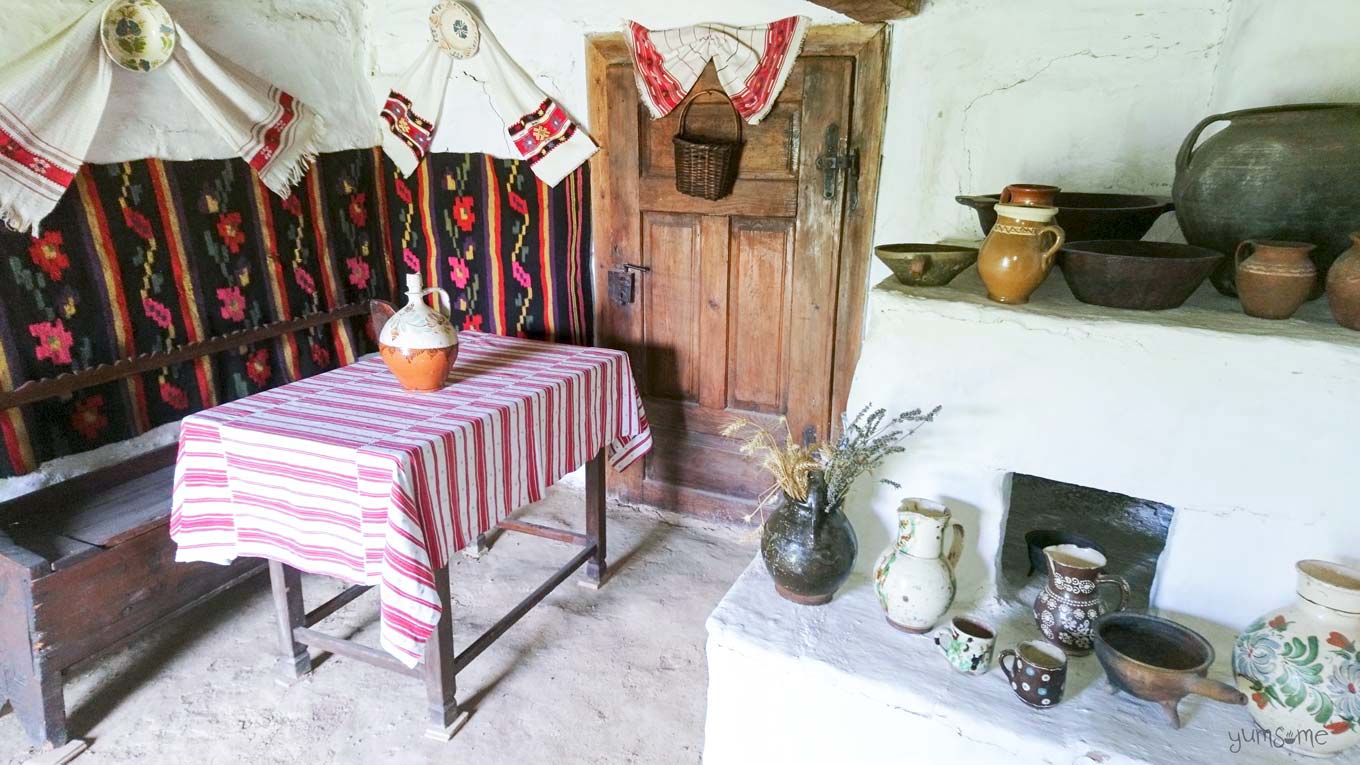
This is a traditional Transylvanian Romanian kitchen. More modern cookers are covered with ceramic tiles instead of lime wash. Our neighbours still have cookers like this one, which serves as heating, as well as a place to cook. The one that was in our house is now in pieces in the pig shed!
How to make fasole bătută
Traditionally, this fasole bătută is made with dried beans, soaked overnight, and by all means, you can make it like this if you wish - I have done - but it does require a bit of forethought (and a couple of hours' cooking time), which is why I tend to go for tinned beans. I'm not always that good at planning ahead. >ahem<
Once cooked, the beans are puréed with a little of the cooking stock, plus onion and garlic, and then topped with caramelised onions.
I've been told that some people add butter and/or cream to their fasole but to be honest, taste-wise, I don't believe it needs it. Also, when fasole is eaten during the four fasting periods of Lent, Apostles, Repose of the Virgin Mary, and Christmas (Nov 15-Dec 24) - dairy isn't used.
That said, I can see why, if you need to have calorie and fat-laden foods to help replenish you after a day of hard manual labour, and to help keep you warm in the winter, making this dairy-rich would do the job nicely.
However, sitting on my butt, writing blog posts, no matter how much it seems to the contrary at times, can in no way be called hard labour... which is why my fasole bătută recipe doesn't contain a whole lot of fat!
You'll love this fasole bătută
Because it's...
- easy to make
- wholesome and full of Vitamin A
- packed with protein and fibre
- gluten-free, soy-free, nut-free
- comforting and creamy
- incredibly delicious
Enjoy this fasole bătută recipe with sausages and pickles, with bread, on crackers... or however you like. I'm sure you'll love it! Poftă bună!
📖 Recipe
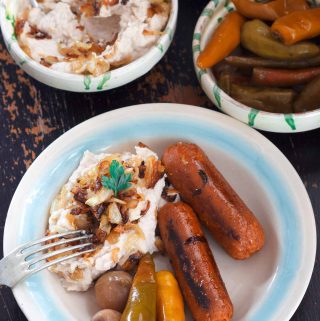
Fasole bătută: Transylvanian White Bean Purée & Fried Onions
Ingredients
For the bean purée:
- 500 g cooked white beans
- 1 litre water
- 1 large onion peeled and left whole
- 4 cloves garlic
- 1 medium carrot
- 1 bay leaf
- 6 black peppercorns
- 2 tablespoon sunflower oil
- Dash sea salt
- Dash ground black pepper
For the fried onions:
- 2 tablespoon sunflower oil
- 2 large onions sliced
- ½ teaspoon brown sugar
- 2 teaspoon sweet paprika
To serve:
- Vegan sausages
- Mixed pickled vegetables
- Fresh bread
Instructions
- Place the cooked beans, water, the whole onion, garlic, carrot, bay leaf, and peppercorns into a large pan or stockpot, bring to the boil, then reduce the heat, and simmer for 20 mins.
- While they are simmering, heat 2 tablespoon oil in a heavy frying pan (e.g. a cast iron skillet), and gently fry the rest of the onions and the sugar over a low heat, until they have started to caramelise. Once cooked, mix in the sweet paprika.
- Once the beans are soft enough to purée, remove the pan from the heat, and drain into a colander over a large bowl. (Don't throw away the cooking stock - it's great to use as a soup base.)
- Remove half of the the onion, all of the carrot, and the bay leaf from the colander, and place the rest of the 'solids' into a food processor, high-speed blender, or back in the pan if using an immersion blender.
- Add the rest of the sunflower oil, and blend until you have a very smooth purée. Add a tablespoon or two of the cooking stock if necessary. Season with sea salt and freshly ground black pepper.
- Top the bean purée with the fried onions, and serve with sausages, mixed pickled vegetables, and some fresh bread.
Notes
- 1 cup = US cup = 240 ml
- 1 tablespoon = US/UK = 15 ml
- 1 fl oz = US = 30 ml
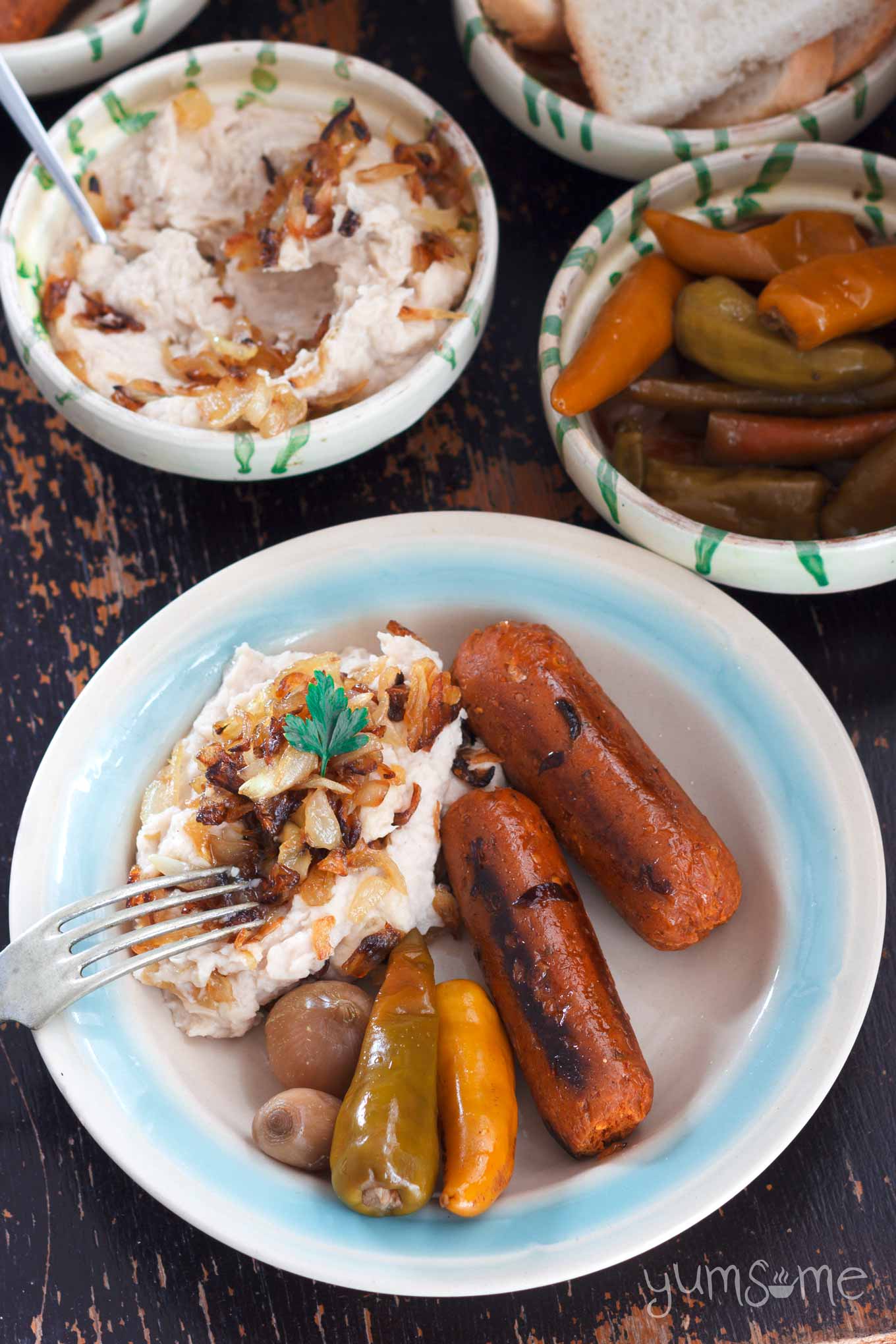
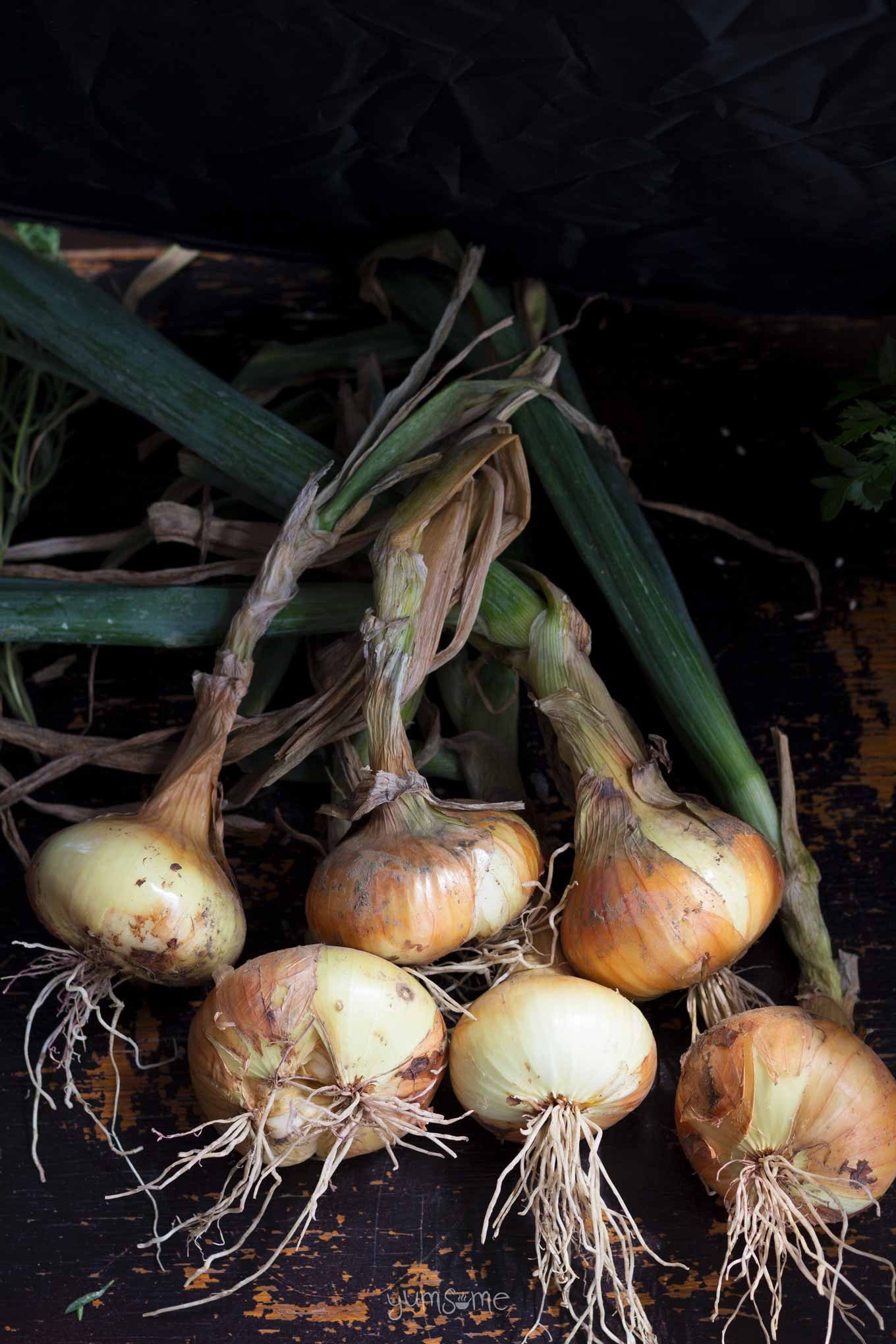
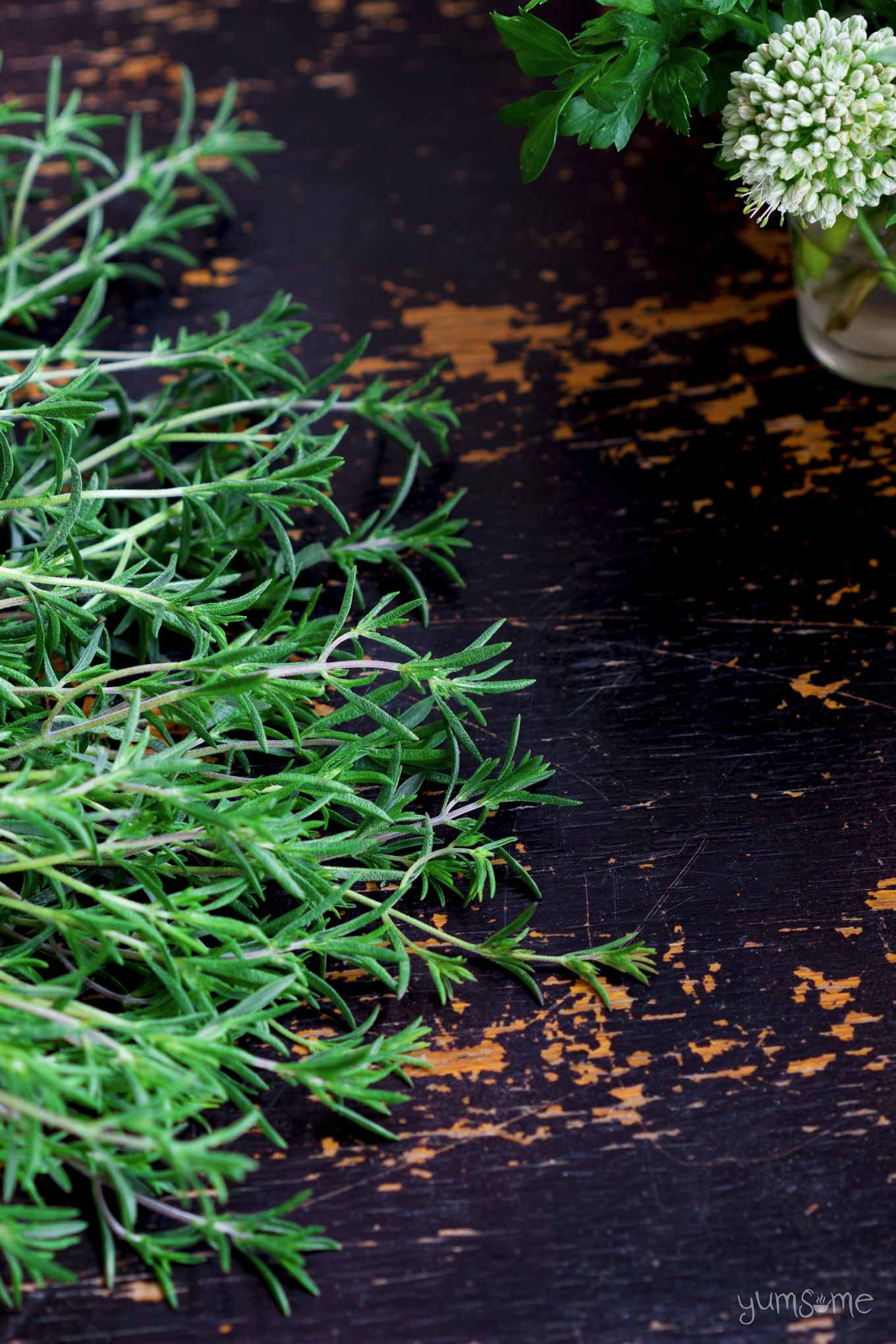
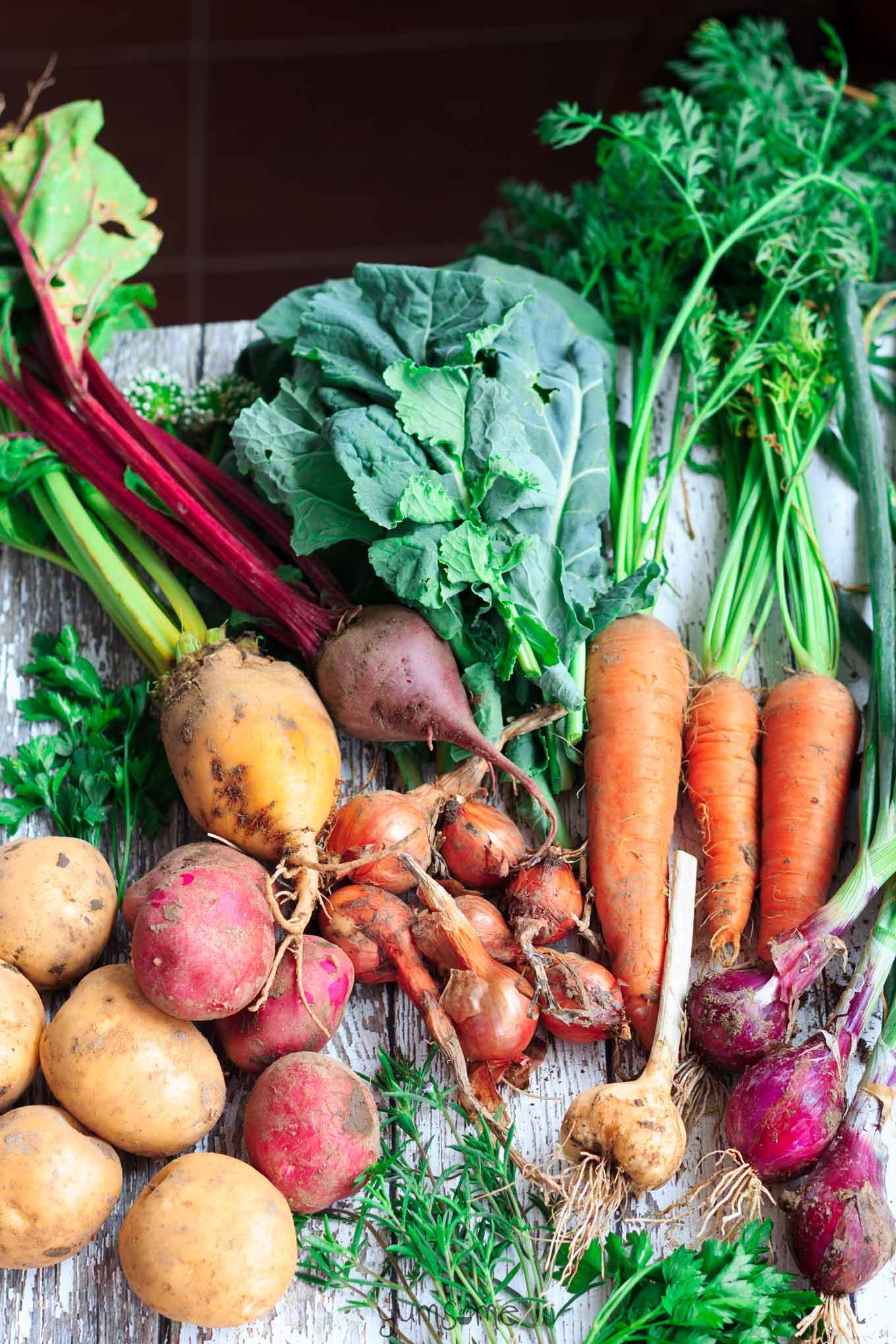
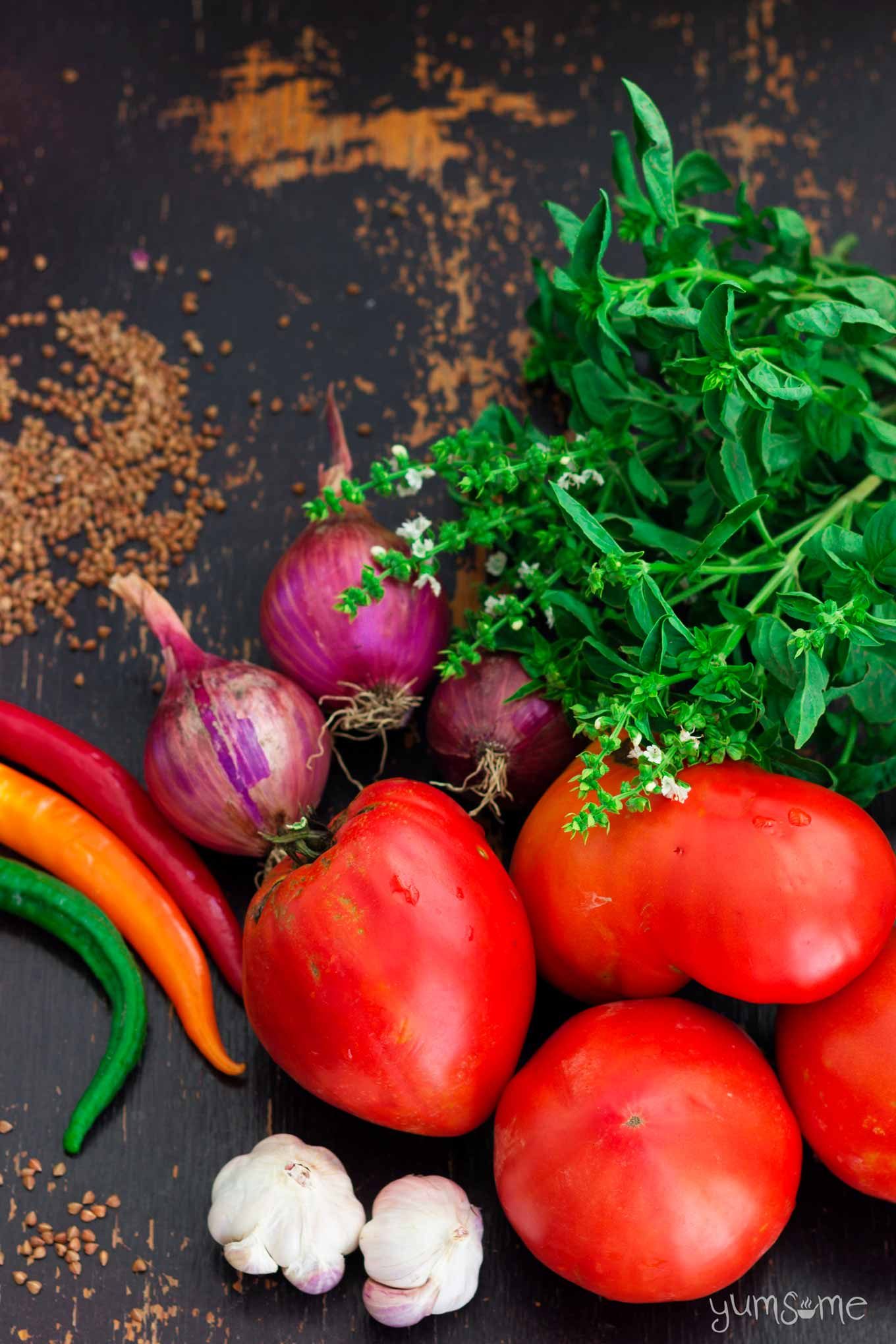
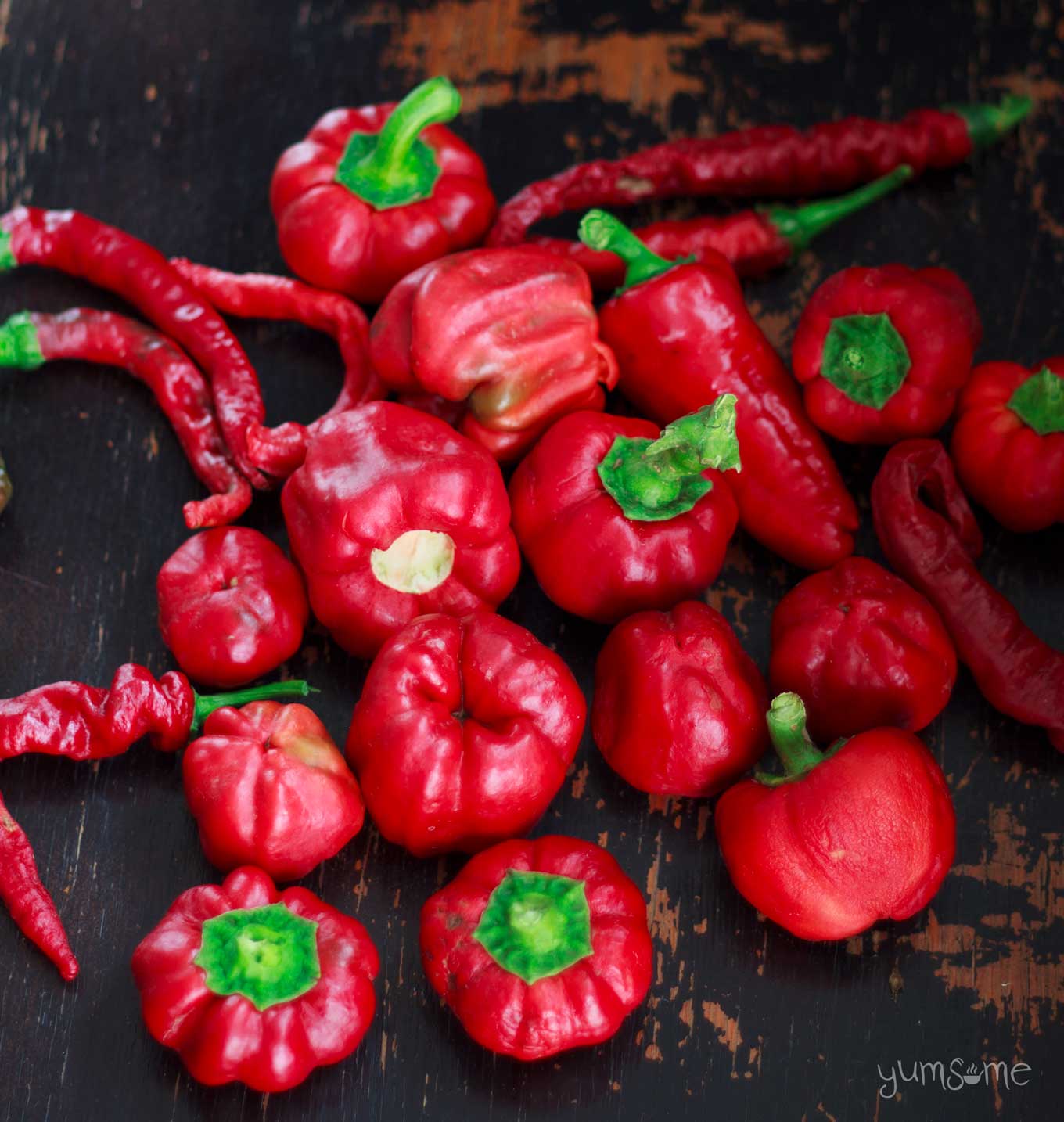
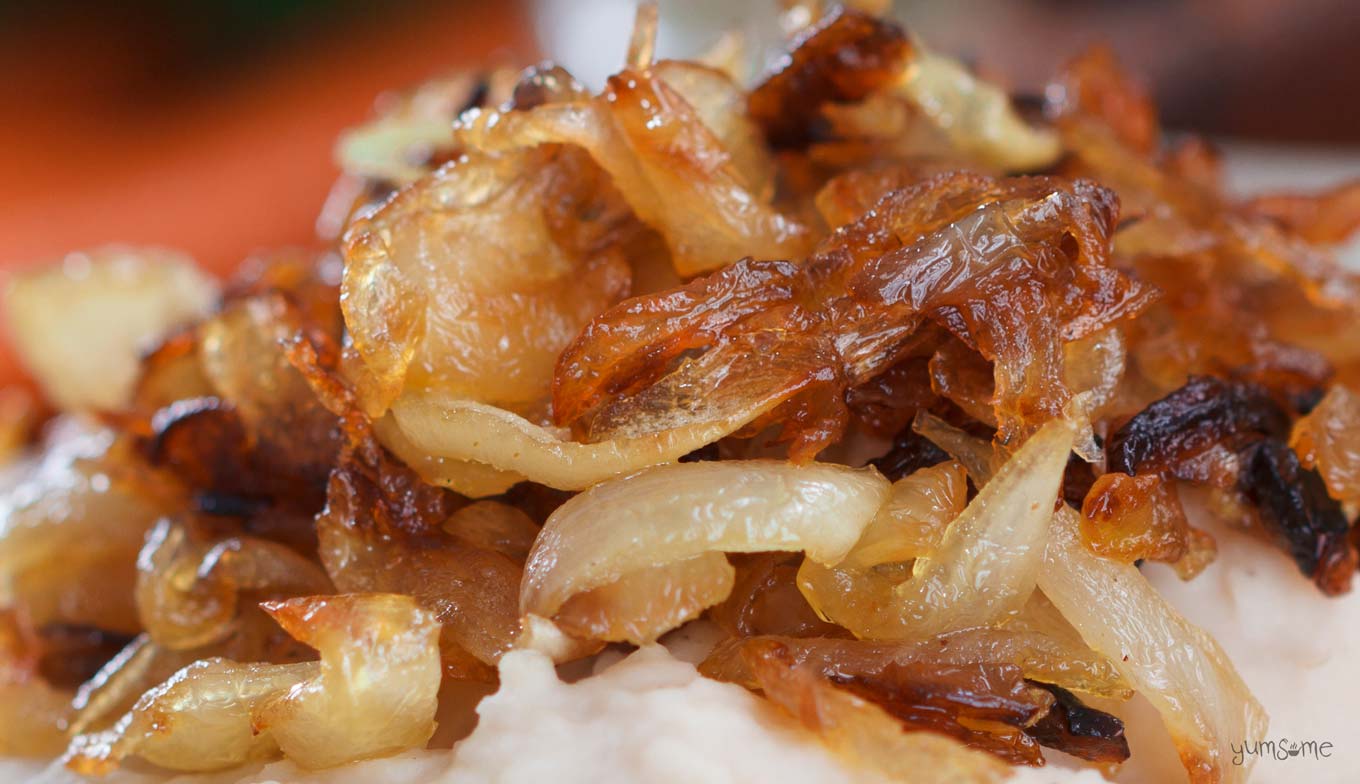
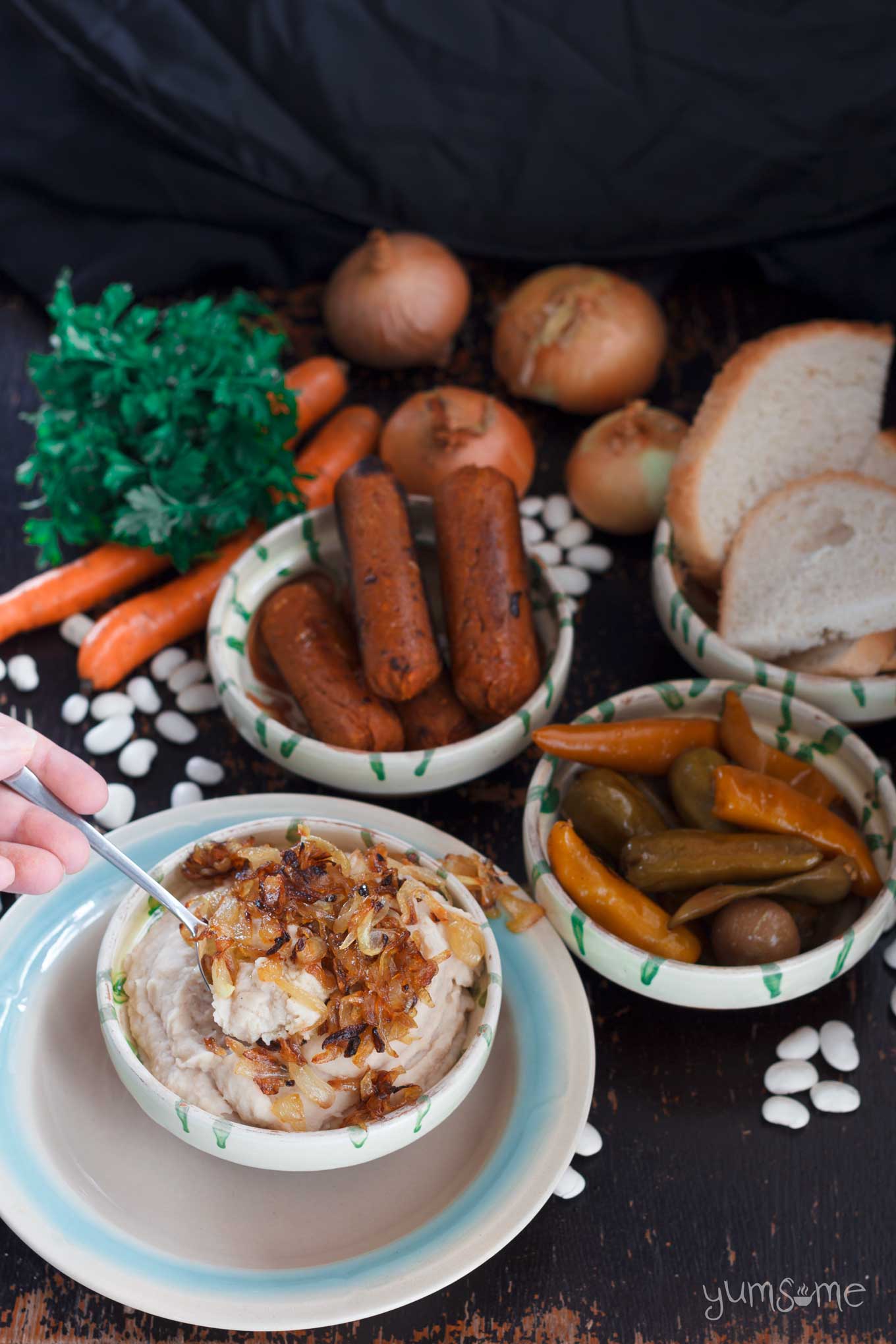
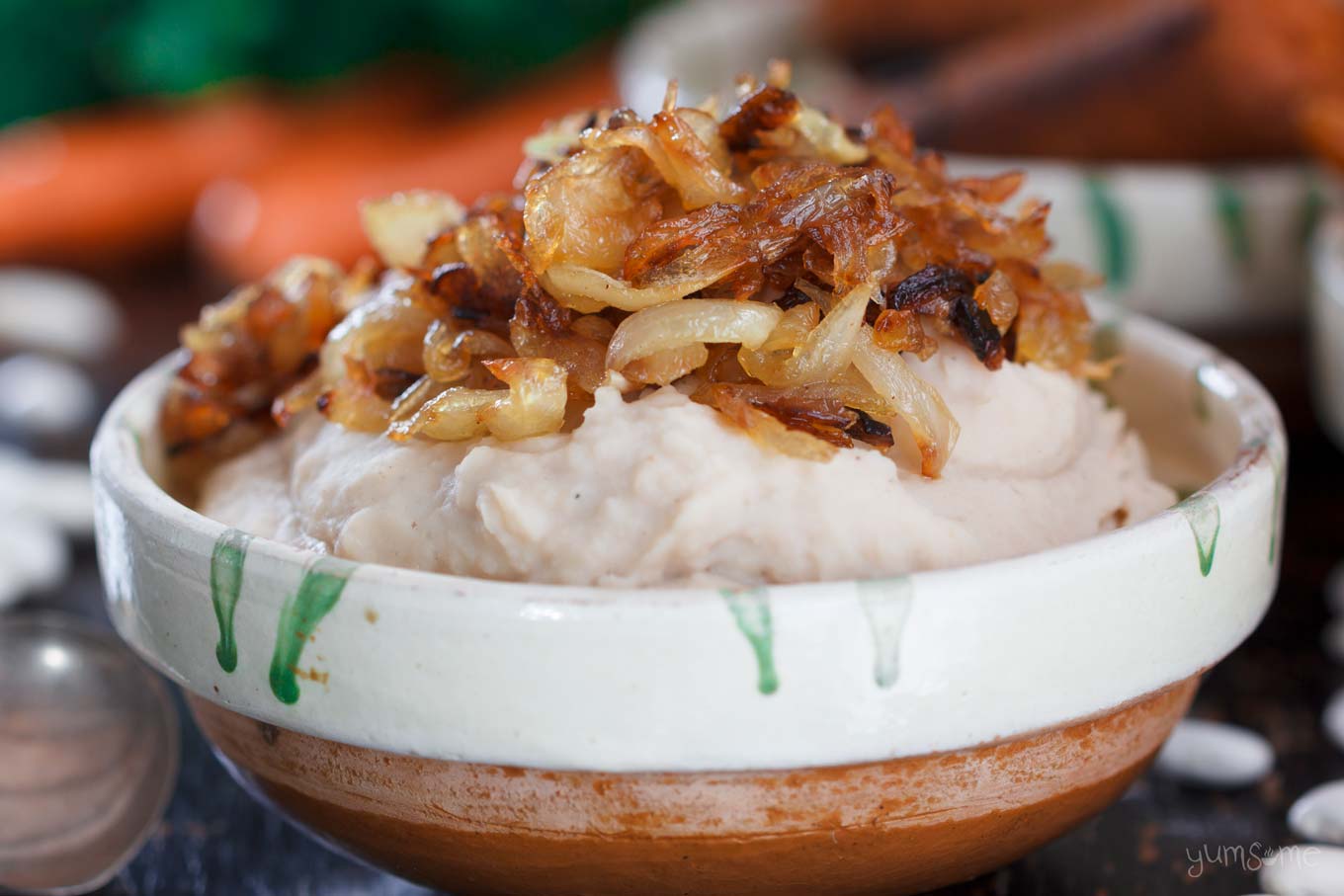

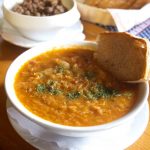

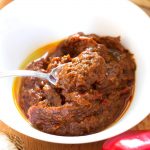

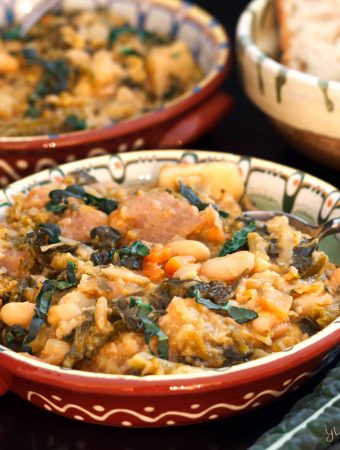
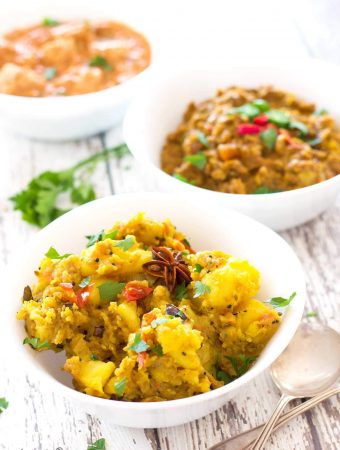



Paula
Perfect recipe. I make it so many times and it makes me smile because it reminds me of my bunică. Mulţumesc!
Nico
Thank you, too Paula - I am so happy you like it. And that it reminds you of your gran! xx
Choclette
I'm a pulse fiend and this sounds so good. I've never heard of this particular dish before, so that's quite exciting. Love the name too. I guess if you have a load of fried onions with it and sausages, you don't really need any fat in the puree anyway.
Nico
Exactly Choclette.... unless you're going to be outside, renovating your garden all afternoon! xx
Cathy @ Planet Veggie
How interesting! And the recipe looks fab too 🙂
Nico
Thanks so much, Cathy! xx
Marty
My maternal grandparents were Transylvanian-Saxon and I remember this was one of my favourites from my grandmother.
We used to eat it just warmed and spread on a thick slice of homemade bread.
Nico
Ooh, how perfect, Marty - I can just imagine the cosy family scene now. I'm so glad my post kindled memories of your grandmother, and I hope that my recipe is a reasonable substitute for hers! xx
ADRIAN-FLORIN DAMALAN
Hi Nico,
The real neame of the bean pureee with fried onins is "FASOLE BATUTA" because "fasole" is bean in romanian.
For the rest all its ok except the quantity of water (for sure its less than 1liter -> max 500ml to get it firm like a mash potatoes ).
Keep the good work with the flavory recipes in here.
Best regards!
Nico
Hi Adrian-Florin,
Thanks so much for your feedback! Regarding the water, it's only used to soften the cooked beans enough to be able to mash, so as I say in the recipe, only a tablespoon of the cooking stock is needed - two spoons, max. Even 500ml of water would make this more like a thick soup than a purée! LOL! xx
Sarah Newman
Wow, I've never seen a combo quite like this before! Looks like healthy comfort foods. I loooove fried onions!!
Nico
I adore fried onions, Sarah... and just the smell of them cooking really makes me salivate! Ha ha! xx
jacqui bellefontaine
I think its a shame that we have lost so much seasonality.
This bean pure sound delicious though i might be tempted to add just a touch of cream . Topped with those caramelised onions, Yum!
Nico
I agree, Jacqui, and I suspect I'm going to feel like a dog with four lamp posts when I move back to Britain, and am able to buy all the things all year-round! I shall try not to go mad though, as I do find that eating seasonally forces me to be more creative, plus there's that whole excitement when it's coming up to asparagus season! xx
Mel | avirtualvegan.com
Mmm this looks amazing! I love the fasole with the onions on top and can imagine how good it is with a veggie sausage. Pickles with it is such a great idea! I am going to try this, probably with the beans in my Instant Pot. Cant wait!
Nico
That's a great idea to cook the beans in an instant pot - do let me know how you get on with it, won't you, Mel? xx
Corina Blum
This sounds like a delicious alternative to our sausages and mashed potatoes! It's must be just the thing to eat at the moment now the weather has turned a little chillier. x
Nico
Yes! It really is very bangers n mash, isn't it?! It's very welcome now, especially given how frugal a dish it is, and that it's really simple, yet so delicious! xx
Rebecca @ Strength and Sunshine
That would be great to serve during the upcoming holiday gatherings!
Nico
Absolutely, Rebecca! xx
Daniela Anderson
I realise how much l miss home every time l see Romanian recipes online. Having lived in the UK for over 8 years already, l have learnt to appreciate more our traditions, our food, our country.
Great to see your post, this recipe looks delicious. Mum cooks a similar dish pretty often, l love having it whenever l go there.
Nico
I am so glad you approve, Daniela! It's always a bit of a worry, even when I've been taught to make something by a local, that someone will come along and tell me it's all wrong!
Romania has such a wealth of tradition, doesn't it? I love that people here still by and large, stick to those traditions - it's very reassuring that in a rapidly-moving world, some things are still held dear. And I love that so many food traditions are cherished too, and that there are so many restaurants serving traditional food. It's just a shame for me that so much of it contains meat and dairy! xx